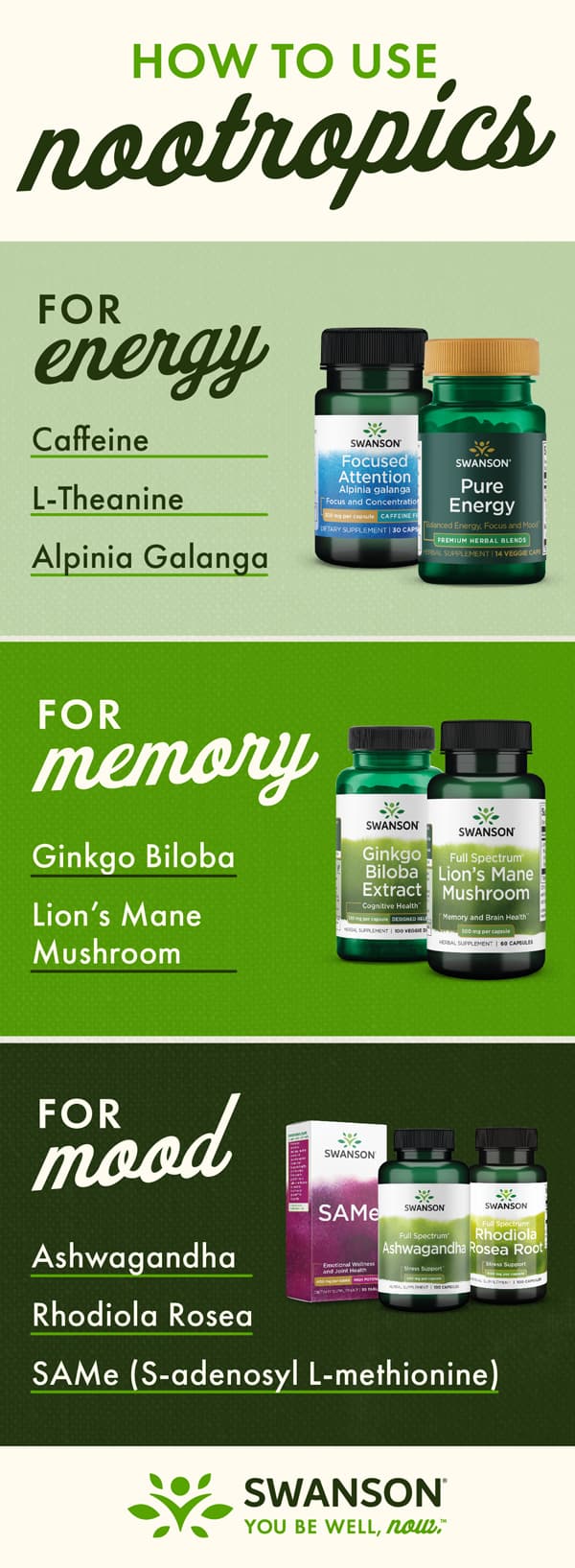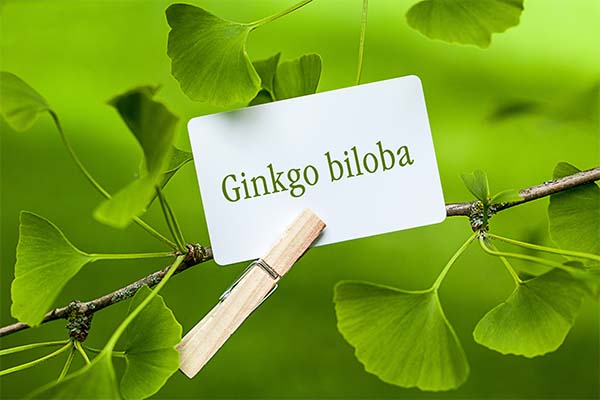The Best Natural Nootropics for Energy, Memory, Mood and Anxiety
Physical and mental sluggishness can make it difficult to keep up with the demands of the day.
If you struggle with mental fatigue, nootropics are brain supplements with the innate potential to support mental health.
Nootropics have been an increasingly popular addition to wellness routines for people from all walks of life. From college students cramming for finals to retired folks looking to maintain their edge, there are various health benefits of these brain-boosting supplements.
New to nootropics?
Not to worry, we’re here to break down common questions about these trending nutrients and offer some suggestions on which best fits your wellness goals.
What are Nootropics?
The world of nootropics is actually pretty broad. A nootropic is a compound that is used to help enhance cognitive functions such as memory, attention, and recall, energy levels and mood.1
They are also known as “smart drugs.” Although there are numerous options out there when it comes to these helpful brain heroes, an easy way to break them down and ensure you’re getting the kind of support you need is by separating nootropics into two groups: natural and synthetic.
Natural nootropics are nutritional supplements and nootropic herbs, while synthetic nootropics are created using chemical ingredients or used as prescription medication.
But just how much can a natural nootropic do for everyday wellness?
Depending on the types of benefits desired, nootropics can be taken as a single ingredient, or combined with other nootropics to form “stacks” for even more enhanced effects.
For example, caffeine is listed among the most widely used nootropics in the world and is well known for its ability to increase alertness and reaction time. However, when combined with L-theanine, this nootropic stack may also be able to improve cognitive performance, focus, accuracy and even mood.2,3
Are All Nootropics Natural?
Not all nootropics are natural—some are made in labs and can be prescribed by doctors.
While prescriptions and synthetic nootropics are shown to have stronger cognitive benefits, they also usually come with adverse side effects.
There are lots of wellness benefits from taking natural nootropics, so let's dive into some of these.
Best Nootropics for Energy
Caffeine

It may not be surprising, but caffeine is the most widely used psychoactive drug in the world, making it an incredibly popular nootropic for daily use. Whether you’re a coffee drinker, tea enthusiast or pre-workout enjoyer, caffeine makes for a quick-fix stimulant to keep your energy reserves fueled and your motivation on task.
L-Theanine
Although you can take caffeine on its own to get a boost of energy, the “jitters” or feelings of anxiousness followed by fatigue that are often associated with caffeine (this stimulant) can sometimes do more harm than good, especially for tasks that take longer periods of time.
These side effects can make taking caffeine alone (on its own) a less than ideal solution for maintaining healthy energy levels for longer periods of time.
However, if you stack L-theanine with caffeine, you can not only enhance cognitive performance due to this amino acid’s ability to cross the blood-brain barrier, but you may also feel calm while boosting mental energy.
“L-theanine on its own is not typically considered a primary energy booster like caffeine. This is why it is often combined with a caffeinated drink. It indirectly contributes to energy by promoting relaxation without causing drowsiness so it may help reduce feelings of stress and anxiety,” says Catherine Gervacio, Registered Dietician and nutrition writer for the 'Living.fit' website. Stacking these two nootropics can help you stay motivated and zero in on the task at hand, making this combo one of the best for boosting energy and mental focus without experiencing a caffeine crash.
Alpinia Galanga
Not a fan of caffeine? This herbal nootropic is a powerful alternative if you’re looking for same-day enhanced focus and mental energy.
Alpinia galanga is part of the ginger family and has been used as an herbal remedy and culinary ingredient for years. While the plant itself is no new kid on the block, emerging clinical studies are showing that this botanical is capable of significantly increasing alertness along with a sense of calm.4
Alpinia galanga works with a cognitive process called the “Attention Network Function” (ANF) to combat stressors that can pull our attention in multiple directions, helping to keep us on track and energized without any negative side effects.
While you can absolutely stack this nootropic with caffeine to amplify the stimulant’s effects, Alpinia galanga can sustain mental alertness just fine on its own, making it an increasingly popular option for those looking for a mental edge.
Best Nootropics for Memory
Ginkgo Biloba
This “living fossil” is a heavily studied botanical when it comes to memory and recall. Ginkgo biloba may have the potential to improve memory and slow cognitive decline that comes with aging.5 Ginkgo is thought to promote multiple cognitive functions by improving blood flow to the brain and regulating neurotransmitters, and can also offer antioxidant benefits that help fight free radicals.
Not only is ginkgo a great resource for recall, but it can also bring some benefits for nervous system support and promote healthy levels of dopamine for a balanced mood.
Lion’s Mane Mushroom
This mushroom provides some adaptogenic benefits and helps manage distraction for better recall. Lion’s mane has been moving up in the memory world and is commonly stacked with other nootropics like coffee for a more productive start to the day, or other mushrooms like reishi or chaga for bolstered immunity or to relax the mind.
As an adaptogenic mushroom, lion’s mane can effectively lower the effects of stress on your body.6 With this approach to encouraging healthy memory, your body may be able to stay in a relaxed state so that you can maintain mental clarity and recall what you need to.
Best Nootropics for Anxiousness
Ashwagandha
Adaptogens like ashwagandha are some of the most effective nootropic herbs when it comes to stress resistance. Because it can easily reach the neurons beyond the blood-brain barrier, ashwagandha is able to help us adapt to stressful situations by lowering cortisol levels and reducing our fight-or-flight response to stress.
Studies suggest that a high concentration of full-spectrum ashwagandha can improve one’s resilience to stress and self-assessed quality of life.7
While studies are still ongoing, research suggests that ashwagandha may even play a role in mitigating feelings of anxiousness and promoting a more balanced mood.8
Stacking Ashwagandha
Ashwagandha is a great baseline nootropic for balancing your mood, but there are some other great nootropics you can stack with it to enhance these benefits. For example, rhodiola rosea is an adaptogenic herb that helps regulate mood and maintain healthy energy levels while Korean ginseng can support immune and cardiovascular health along with a healthy response to stress.
Stacking nootropics like these enables them to work together to enhance your overall physical and mental health.
Best Nootropics for Mood
SAMe (S-adenosyl L-methionine)
SAMe (pronounced “Sammy”) works well for regulating a positive mood and healthy wellbeing by acting as a methyl donor for a number of neurotransmitters to promote “feel good hormones” like serotonin and dopamine. Because of this compound’s ability to pass through the blood-brain barrier (BBB), SAMe makes for a powerful mood booster no matter what the day brings.9, 10
Factors to Consider When Selecting a Natural Nootropic
There are several crucial factors to consider when selecting a nootropic.
“First and foremost, ensure that the product has undergone third-party testing. Testing is vital to guarantee that the ingredients listed on the label accurately reflect what's contained in the product,” says Megan Huff, RD Clinical Dietitian and owner of nutritionbymegan.com.
Additionally, consider the cost, research the efficacy and ensure you select the nootropic that fits your specific brain health needs because each nootropic exerts different health effects. For instance, some may be more beneficial for memory while others may help mood regulation.
Lastly, always consult with your healthcare provider before incorporating a nootropic into your routine, as it may interact with other medications, supplements, or foods you consume, says Huff.
Are Nootropics Effective?
While no two nootropics are the same as they come from different plants and botanicals, they all offer significant benefits for mental acuity and wellbeing. Because of these unique properties, nootropics make for an effective and versatile solution when it comes to cognitive function and acuity.
Available nootropics are growing in numbers each day, so it’s important to consider the quality of the ingredients while you’re searching to get the most benefits.
If you want to ensure you’re getting the highest-quality natural nootropic supplements curated by experts in the field, you’ll be happy to find a large assortment here at Swanson Health Products.
We hope this article gives you a good start when it comes to incorporating nootropics into your wellness routine. Still have questions? Give one of our teammates in Customer Care a call to explore which options might be best for you.
You be well, now.
Swanson
*These statements have not been evaluated by the Food and Drug Administration. These products are not intended to diagnose, treat, cure, or prevent any disease.

About Dr. Christopher Oseh
Christopher Oseh, MD, is a trained primary care physician leveraging almost a decade of clinical experience managing and counseling patients toward better health through positive lifestyle changes. He has a strong track record of treating and co-managing individuals with chronic illnesses.
Sources:
- Natural Nootropic. Evidence-based Complementary and Alternative Medicine. Read source
- L-theanine and Caffeine. Nutritional Neuroscience. Read source
- L-theanine and Caffeine Improves Cognitive Performance. Nutritional Neuroscience. Read source
- Alpinia Galanga. Journal of the American College of Nutrition. Read source
- Ginkgo Biloba. Psychopharmacology. See source
- Adaptogenic Activity. Annals of the New York Academy of Sciences. Read source
- Ashwagandha. National Library of Medicine. Read source
- Ashwagandha. PubMed. Read source



